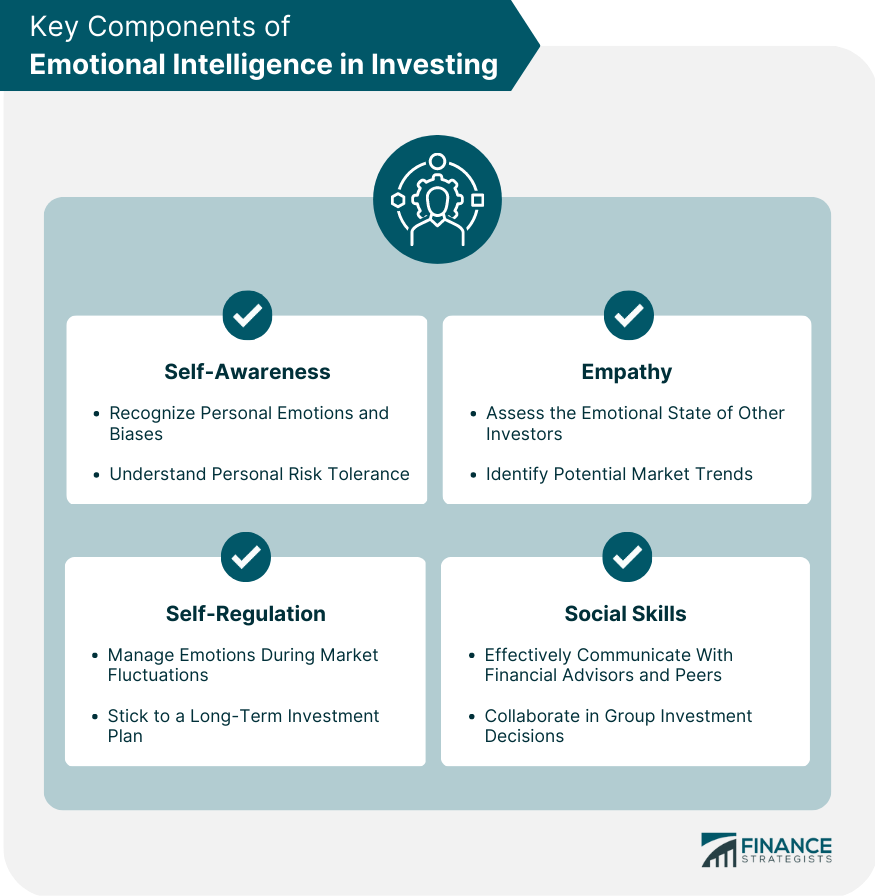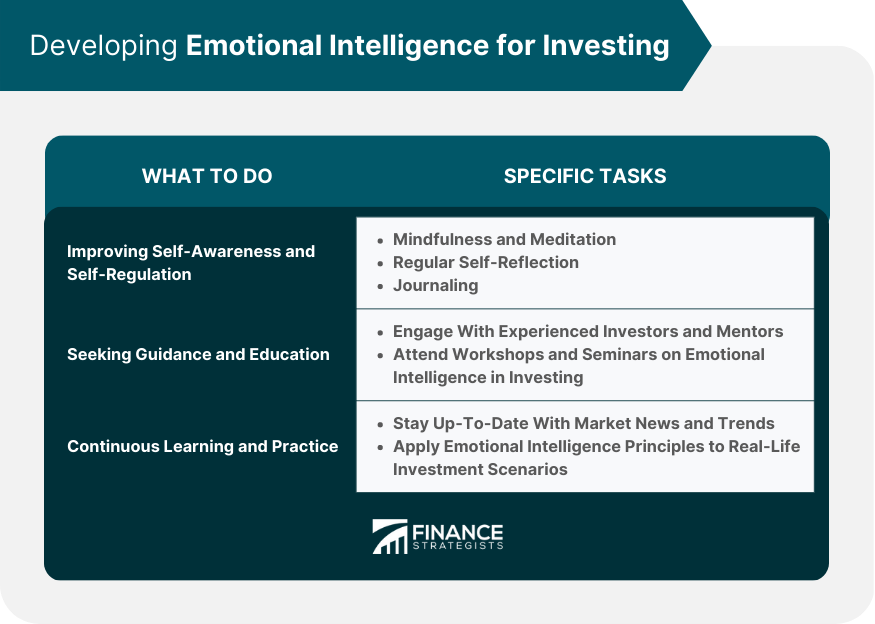Emotional intelligence (EI) refers to the ability to recognize, understand, and manage one's own emotions as well as the emotions of others. It involves self-awareness, self-regulation, empathy, and social skills essential for effective communication, decision-making, and relationship-building. Emotional intelligence plays a crucial role in decision-making, as it enables individuals to recognize and manage their emotions, consider the emotions of others, and make more rational, objective choices. In the context of investing, emotional intelligence can help investors avoid common psychological biases and pitfalls, ultimately leading to better investment decisions. There is a strong connection between emotional intelligence and investing, as emotions can significantly impact investment decisions and market behavior. Investors with high emotional intelligence are better equipped to navigate financial markets' emotional ups and downs, maintain a long-term perspective, and avoid irrational decision-making driven by fear or greed. Fear and greed are two primary emotions that drive financial markets and can significantly influence investment decisions. Fear can cause investors to sell assets during market downturns, while greed can lead to overconfidence and excessive risk-taking during market upswings. Emotional intelligence helps investors recognize and manage these emotions, promoting more rational decision-making. Overconfidence and loss aversion are other common emotional biases that can impact investment decisions. Overconfidence can lead investors to underestimate risks and overestimate their abilities, while loss aversion can cause them to hold onto losing investments for too long. Emotional intelligence can help investors become aware of these biases and make more objective decisions. Herd mentality and groupthink are psychological phenomena that can lead investors to follow the crowd and make decisions based on the actions of others rather than their own analysis. Emotional intelligence allows investors to recognize these influences and maintain an independent perspective, reducing the likelihood of making poor investment choices due to social pressures. Confirmation bias and recency bias are cognitive biases that can distort investment decisions. Confirmation bias involves seeking information that supports one's beliefs while ignoring contradictory evidence, while recency bias involves placing too much emphasis on recent events. Emotional intelligence can help investors recognize and counteract these biases, leading to more balanced and informed decision-making. In the context of investing, self-awareness involves recognizing one's own emotions and biases and understanding how they can influence decision-making. By developing self-awareness, investors can identify emotional triggers and cognitive biases, allowing them to make more objective and rational investment decisions. Self-awareness also includes understanding one's personal risk tolerance, which is crucial for constructing an investment portfolio that aligns with individual preferences and goals. By being aware of their risk tolerance, investors can select investments that provide an appropriate balance between risk and return, helping them achieve their long-term financial objectives. Self-regulation involves the ability to manage one's emotions during market fluctuations, preventing panic selling or impulsive buying. By practicing self-regulation, investors can maintain a long-term perspective and avoid making emotionally driven decisions that could jeopardize their investment goals. Another aspect of self-regulation is the ability to stick to a long-term investment plan, even during periods of market volatility. Emotional intelligence helps investors resist the urge to react impulsively to short-term market movements and instead focus on their long-term objectives, leading to more consistent and successful investing outcomes. Empathy involves the ability to understand and share the emotions of others. Empathy can help investors assess the emotional state of other market participants, providing valuable insights into potential market trends and opportunities. By understanding the emotions driving other investors' decisions, empathetic investors can identify potential market trends and make more informed investment choices. This ability to "read" the market can be valuable in navigating the complex and often emotionally charged world of investing. Strong social skills are essential for effectively communicating with financial advisors, peers, and other market participants. Emotional intelligence enables investors to build rapport, collaborate, and share ideas with others, enhancing their investment decision-making process and contributing to overall investment success. Emotional intelligence also plays a role in group investment decisions, as it allows investors to work effectively with others, manage group dynamics, and reach a consensus on investment strategies. By leveraging their social skills, emotionally intelligent investors can contribute to more productive and successful group investment decision-making processes. Mindfulness and meditation are effective techniques for enhancing self-awareness and self-regulation in investing. Practicing mindfulness can help investors become more aware of their emotions and thought patterns, while meditation can promote emotional stability and improve decision-making during periods of market volatility. Regular self-reflection and journaling can also help investors develop self-awareness and self-regulation. By consistently reflecting on their emotions, biases, and investment decisions, investors can identify areas for improvement and work on managing their emotions more effectively in the future. Engaging with experienced investors and mentors can provide valuable insights and guidance on the role of emotional intelligence in investing. By learning from others who have successfully navigated the emotional challenges of investing, individuals can develop their own emotional intelligence skills and apply them to their investment strategies. Workshops and seminars focused on emotional intelligence in investing can provide valuable education and practical tools for enhancing emotional intelligence. By attending these events, investors can learn from experts in the field and gain a deeper understanding of the importance of emotional intelligence in the investing process. Staying informed about market news and trends is essential for developing emotional intelligence in investing. By being aware of current events and market fluctuations, investors can better understand the emotions driving market behavior and apply their emotional intelligence skills to make more informed decisions. Regularly applying emotional intelligence principles to real-life investment scenarios can help investors refine their emotional intelligence skills and improve their investment decision-making. By consciously practicing emotional intelligence in their investment activities, investors can develop the ability to recognize and manage their emotions, leading to more rational and objective decision-making. Integrating emotional intelligence into investment strategies offers numerous benefits, including improved decision-making, more effective risk management, and the ability to navigate market volatility with greater confidence. By prioritizing emotional intelligence development, investors can enhance their investment performance and achieve long-term financial goals. Developing emotional intelligence can lead to significant improvements in investment performance and decision-making. By recognizing and managing emotions, understanding the emotions of others, and avoiding psychological biases, investors can make more rational and objective decisions that contribute to long-term success in the financial markets. Investors should prioritize the development of emotional intelligence as a critical component of their investment strategies. By focusing on self-awareness, self-regulation, empathy, and social skills, investors can enhance their ability to navigate the emotional challenges of investing and make more informed decisions. For investors looking to develop their emotional intelligence and improve their investment strategies, seeking professional wealth management services can provide valuable guidance and support. By working with experienced financial advisors who understand the importance of emotional intelligence in investing, individuals can access expert advice, education, and resources to help them enhance their emotional intelligence skills and achieve long-term investment success.What Is Emotional Intelligence in Investing?
Role of Emotional Intelligence in Successful Investing
Understanding Emotions in Financial Markets
Fear and Greed
Overconfidence and Loss Aversion
Impact of Emotions on Investment Decisions
Herd Mentality and Groupthink
Confirmation Bias and Recency Bias
Key Components of Emotional Intelligence in Investing
Self-Awareness
Recognizing Personal Emotions and Biases
Understanding Personal Risk Tolerance
Self-Regulation
Managing Emotions During Market Fluctuations
Sticking to a Long-Term Investment Plan
Empathy
Assessing the Emotional State of Other Investors
Identifying Potential Market Trends
Social Skills
Effectively Communicating with Financial Advisors and Peers
Collaborating in Group Investment Decisions

Developing Emotional Intelligence for Investing
Improving Self-Awareness and Self-Regulation
Mindfulness and Meditation
Regular Self-Reflection and Journaling
Seeking Guidance and Education
Engaging with Experienced Investors and Mentors
Attending Workshops and Seminars on Emotional Intelligence in Investing
Continuous Learning and Practice
Staying Up-to-Date with Market News and Trends
Applying Emotional Intelligence Principles to Real-Life Investment Scenarios

Final Thoughts
Emotional Intelligence in Investing FAQs
Emotional intelligence in investing refers to the ability to recognize, understand, and manage one's own emotions as well as the emotions of others in the context of investment decision-making.
Emotional intelligence can help investors avoid common psychological biases and pitfalls, ultimately leading to better investment decisions. Investors with high emotional intelligence are better equipped to navigate financial markets' emotional ups and downs, maintain a long-term perspective, and avoid irrational decision-making driven by fear or greed.
Strategies for improving emotional intelligence in investing include mindfulness and meditation, regular self-reflection and journaling, seeking guidance and education from experienced investors and mentors, attending workshops and seminars on emotional intelligence in investing, and continuously learning and practicing emotional intelligence principles.
Yes, there are numerous examples of successful investors who have demonstrated high emotional intelligence in their investment strategies. By examining their experiences, we can identify key takeaways and lessons that can be applied to our own investment strategies.
Integrating emotional intelligence into investment strategies offers numerous benefits, including improved decision-making, more effective risk management, and the ability to confidently navigate market volatility. By prioritizing emotional intelligence development, investors can enhance their investment performance and achieve long-term financial goals.
True Tamplin is a published author, public speaker, CEO of UpDigital, and founder of Finance Strategists.
True is a Certified Educator in Personal Finance (CEPF®), author of The Handy Financial Ratios Guide, a member of the Society for Advancing Business Editing and Writing, contributes to his financial education site, Finance Strategists, and has spoken to various financial communities such as the CFA Institute, as well as university students like his Alma mater, Biola University, where he received a bachelor of science in business and data analytics.
To learn more about True, visit his personal website or view his author profiles on Amazon, Nasdaq and Forbes.











